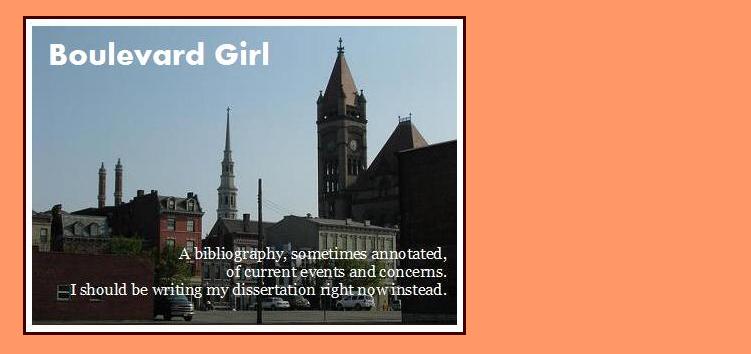If the country has never been so rich in policy institutes and policy scholars producing policy positions and policy papers, we don’t seem to be doing so well when it comes to adopting and sticking to good policies. Our capacity for sensible public discussions about our alternatives, and our ability to produce and elect leaders who understand the world we live in also look weak. This isn’t just a criticism of the Obama administration; the Bush and the Clinton administrations were both better at rhetoric than at policy. Increasingly I’m drawn to the conclusion that the weak links in the American foreign (and domestic) policy processes reflect weaknesses in the way we train and prepare people for this kind of work and more generally in the relationship of intellectuals to American society overall.
As someone who has worked and hopes to keep working in the three major groups of institutions where American intellectuals are most active (the academy, ’serious’ journalism and publishing, and policy institutes or think tanks), I find that the relations among these institutions and between all of them and the educated lay public are shifting in complex and not always helpful ways. The problems we face cannot simply be addressed by writing more and better policy papers in think tanks; we need to prepare for big changes in the institutions where intellectuals work, in the way that intellectuals understand their role in society, and in the way that intellectuals are formed.
The rise of the think tank world (the Council on Foreign Relations alone has gone from about maybe one dozen senior fellows when I joined to several times that today) partly reflects a crisis in the universities. A generation ago, university professors were the country’s repository of talent for most policy matters, foreign and domestic. Henry Kissinger was teaching at Harvard before he joined the Nixon Administration. Partly as a result of the Vietnam War, which created an entire generation of academics who believed that to serve the American government was to betray the purity of the scholarly calling, and partly as the result of academic pressures for ever narrower specialization and ever more emphasis on theoretical constructs, the universities have become less and less relevant to the policy process. (Law schools and economics departments are the principal exceptions to the rule.) Great scholars with global reputations like Joe Nye at Harvard can still move between the academy and government, but each generation is finding that harder to do.
The rise of think tanks reflects many forces, including the interest of ideological or economic special interests to collect and promote 'stables' of thinkers who will reliably produce work that reflects a given worldview. But the reason think tanks have become so valuable in the government and policy world is because a gap grew up that needed to be filled. The academy has abdicated its former role of providing comfortable resting places for out of power (or preparing for power) policy thinkers. The political studies and international relations departments of many leading universities are becoming places for introspective, sometimes naval-gazing study aimed chiefly at clarifying and reflecting on the terms of debate and the scholarly discourse; the think tanks have emerged to host extroverted study aimed primarily at changing the external world. This is not, I think, a particularly elegant, cost-effective or intellectually fruitful way of organizing American intellectual life or of teaching young people, but there it is.
...In the late Middle Ages many monkish scholars pursued ever finer theological distinctions and arguments as the church rotted away in gross corruption and society moved beyond the ideas and institutions that had once served it well. Something like that seems to be happening today in the United States; it’s not a good trend.
...Many Americans come out of the higher educational system with a combination of detailed knowledge about a specific subject area and quite naive and simplistic ideological views. Simplistic ideas about ‘nation building’, the relationship of development and democracy, the nature of democracy and both the nature and direction of the historical process itself are widespread among American policymakers and even more prevalent among the bureaucrats and experts who staff large government institutions. Quite responsible people sometimes have shockingly crude ideas about the relationship of power to ideals in history, the nature of a liberal international order, and the relationship of culture and history to contemporary politics not only in the United States but around the world.
Like the urban planners of past generations who devastated whole cities by building vast projects that ignored the human factor, many of the people who think about policy in this country are in the grip of great theoretical abstractions and are poorly prepared to manage the inevitable problems when the grand concept meets the friction and resistance of history and human reality. The ambitious globalism of the Clinton administration, the Bush administration’s dash for democracy and the Obama administration’s liberal internationalism are very different approaches intellectually speaking, but they share a common abstraction from the real world...
The individuals who try to apply these caricatured ideals to history aren’t stupid; they are often extremely intelligent. But the educational system that created them and the intellectual life and discourse that has surrounded them have failed to prepare them for their tasks. We are failing to provide what in an earlier post I called the που στω, or ’standing place’ (as in “Give me a lever and a place on which I can stand, and I will move the world”): a vision of culture and history that enables someone to see far, reflect broadly, think deeply and communicate clearly about the major issues of the day.
See the whole thing at The American Interest Online.
___



